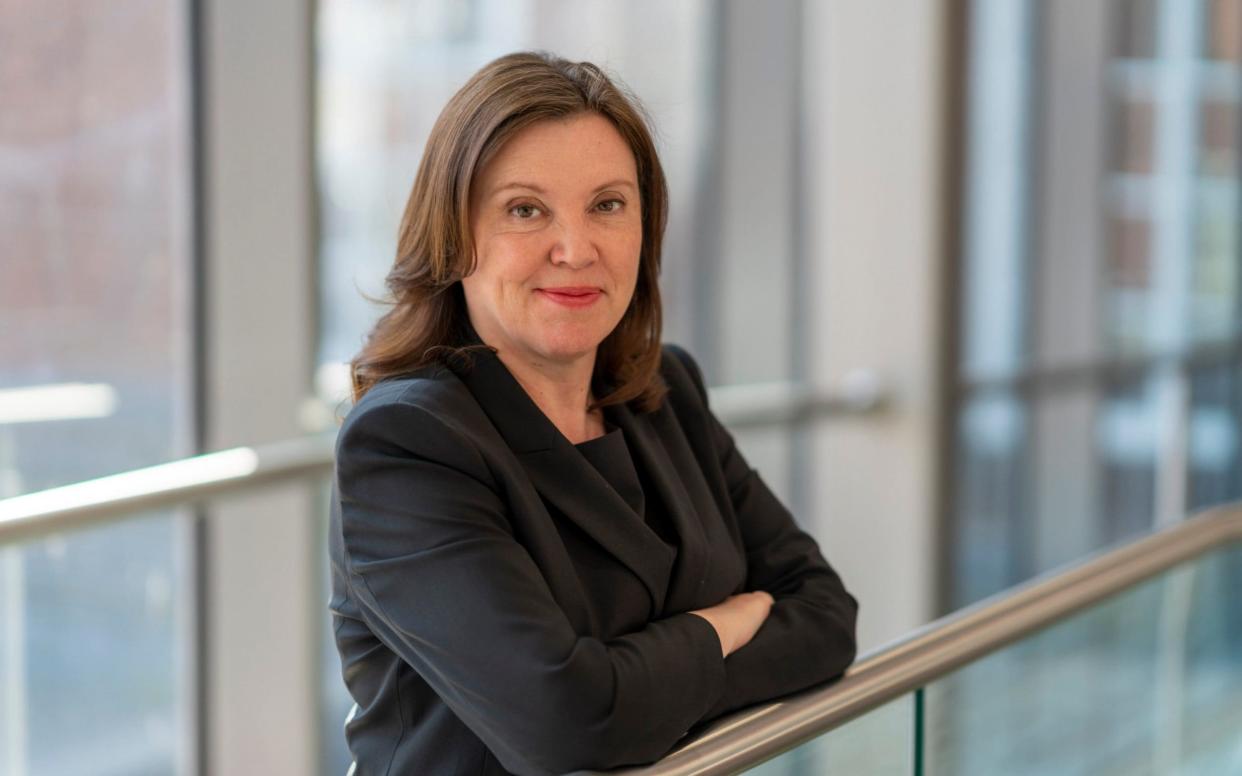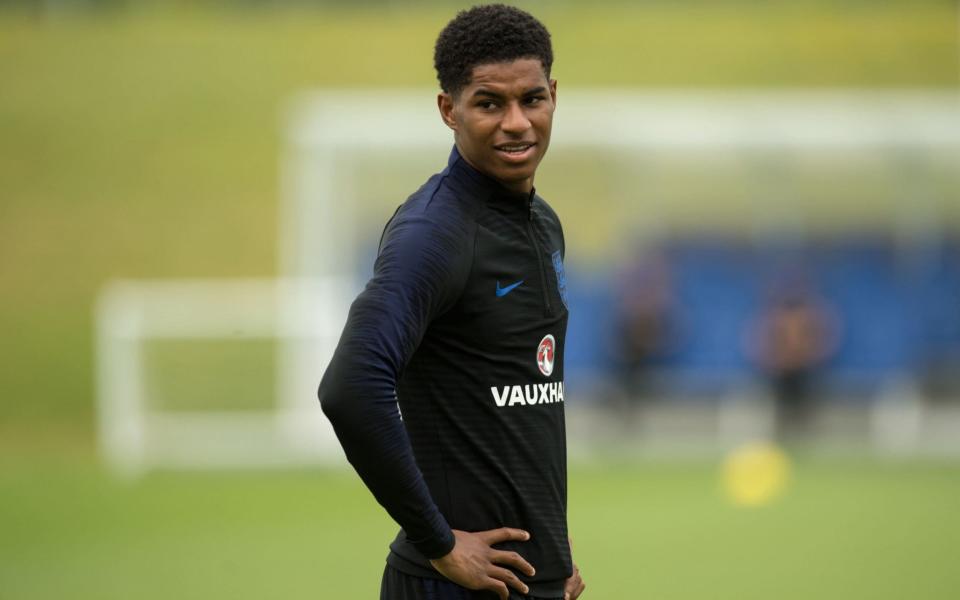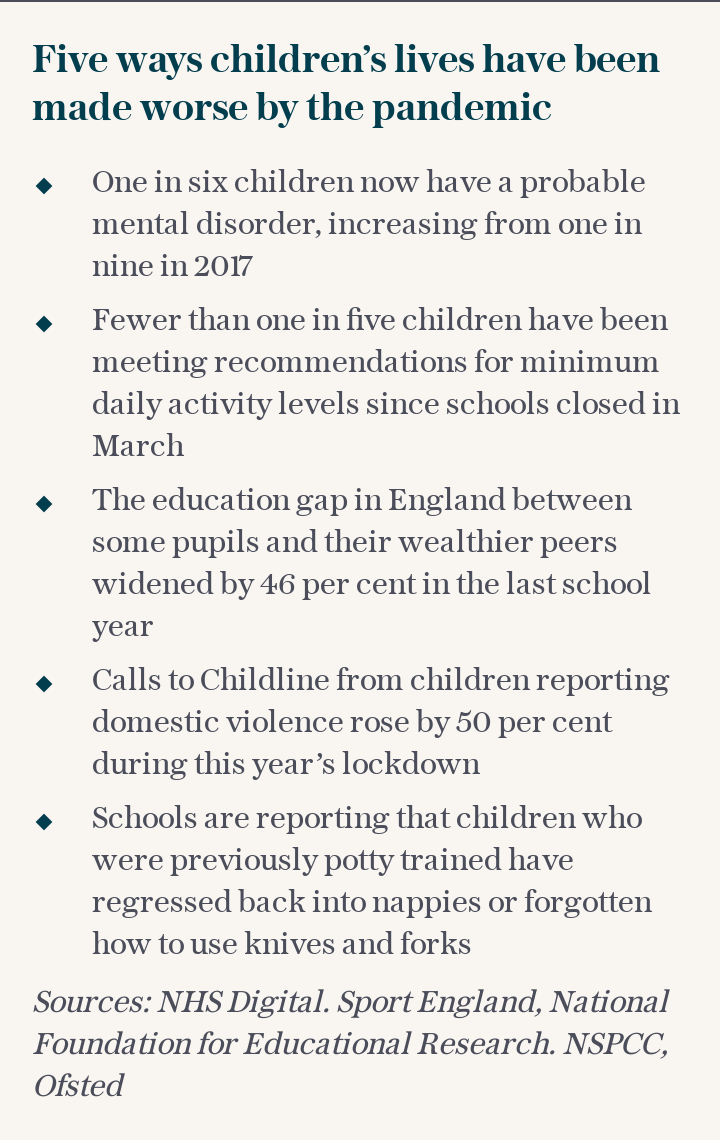‘Children are the least likely to be affected by the virus but they have taken the worst hit’

- Oops!Something went wrong.Please try again later.
- Oops!Something went wrong.Please try again later.
You can take the woman out of the school but you can’t take the school out of the woman. There is still something of the head teacher about Dame Rachel de Souza as she talks about her first moves as Children’s Commissioner – think spotting and pushing talent, and knocking heads together to get things done.
Both informal and authoritative, Dame Rachel – “call me Rachel” – has picked Marcus Rashford, the Manchester United footballer turned school meals campaigner, to front Monday’s launch of The Big Ask, billed as a once-in-a-generation “Beveridge Report for children”. And she is determined to get government ministers working together, to get things done. “It’s my first time working in Westminster,” she says, “and what I’m finding is that departments come up with great ideas and policies, but it’s just not joined up enough.”
De Souza took over the post of commissioner in February after a career in schools: first as a teacher, then as a head teacher and later as a principal of an academy. For nine years, she was chief executive of the multi-academy Inspiration Trust, running five primary schools, six secondaries and a sixth form college in East Anglia.
Since it was first created 17 years ago, the role of commissioner has been to particularly focus on the most vulnerable of children. But after a year of being stuck at home and missing school for months on end, all children are her concern, she says.
“They were the least likely to be affected by the virus but they have taken the worst hit. Schools closed for 19 weeks. Before the pandemic, one in nine was diagnosed with mental health problems and now it’s one in six.”
On the day we speak, she is back at an Inspiration Trust school to film an assembly for the video launch of The Big Ask – the largest ever consultation with England’s children, which goes live on Monday, when all those from five to 18 will be able to fill in an online survey to recount how the pandemic has affected them and help her review how their futures can be improved.

As well as De Souza, young people will speak alongside Rashford. “It took a bit of work persuading his agent, but particularly for our secondary school pupils it was important,” she says. “Marcus Rashford is a real icon to them. He can be rightly proud of his achievements. And an added bonus is that he is devoted to his mother...”
De Souza wants to hear children’s views on family life, schooling, friends, anxieties about illness and mental health after the pandemic, as well as hopes for the future. She has already talked to children about how they feel. “It’s unequivocal. In every conversation they talk about anxiety.
“The kind of things that are coming through are a big focus on family strain. Families aren’t predictable. Family life is messy. Add lockdown into the mix and possibly work and financial difficulty – into some families comes divorce, alcoholism, or mental illness, perhaps poverty or in extreme, but sadly not rare, cases, abuse.”
Talking to teenagers, their dreams are clear. “Some want to save the world; others focus on mental health. One I talked to wanted to be a vet but he was worried about student loans and not getting work or housing. And they hope for families of their own one day. But we’re also hearing these [worries] about them not being as well off as their parents”.
Earlier this month, Education Secretary Gavin Williamson warned in The Telegraph that children have returned to school after months without any discipline. De Souza isn’t so sure that lack of discipline is the issue behind behavioural problems, so much as trauma.
“The boundaries were blurring between home and school; some children are in families with parents who need support on how to parent well. Our greatest concern was children in homes where things are really tricky.”

That trickiness is not just about economic disadvantage, she believes, but ‘affluent neglect’ of children’s emotional needs by parents overly preoccupied with their careers.
“In the past I’ve worked in areas with a lot of poverty and social problems and overly affected by crime and lack of work. I thought about disadvantage in that way. But focusing on emotional neglect is really important, too. A child can be facing difficulties even if they’re not in poverty.” It’s clear she thinks the post-Covid moment is a huge opportunity, unlike any since the Second World War. The post-war political generation “could have been floored. Instead, some of the most aspirational thinking came about. We need that now. If I can be the joiner-upper, getting ideas, people going in the right direction, we’re on the way”.
She is convinced that outdoor activities are vital in the coming months for their physical and mental health – as a great fan of Outward Bound, in a previous head teacher post she invited the local riding school to give children who had never encountered horses their first riding lessons – but cites six different Whitehall departments, each running kids’ summer schools with no reference to one another.
For her, “joined up” also means working with officials in similar fields: Sir Kevan Collins as education recovery tsar, focusing on children catching up at school, and Amanda Spielman as head of Ofsted.
But the Children’s Commissioner has two super powers: she can demand data and she can demand access. De Souza says she is keen to use those to go further than the review Ofsted is planning into safeguarding in schools, in the wake of allegations about sexual abuse in schools from fellow pupils.
“I’m increasingly concerned about the issues that have been arising around harassment and misogynistic cultures – I want to look closely at that.” She banned mobile phones in school when she was a head and is concerned about the problems their content causes, not least the access they give to online porn.
“We have to ask some hard questions about whether we are making the tech companies take enough responsibility over issues such as age verification. We need to be very open-eyed, take some very clear action and support our girls”.
We want as many children as possible to take part in our upcoming survey, so we can tell the Government what children think and what they need to make their lives happier.
We need your help to spread the word 👇 https://t.co/jPARciEPD8— Children's Commissioner for England (@ChildrensComm) March 24, 2021
De Souza, now 53, says as a schoolgirl she was a rebel who eventually became fascinated by literature and theology. “There were times when I was on free school meals but I was a member of a very supportive family and community. I might have had only one set of clothing but I could see my way, realise my dreams.”
The first in her family to go to university, she studied theology and philosophy at the Jesuit-run Heythrop College in London, where she met her husband-to-be. After four miserable days as a trainee graduate accountant, she quit and switched to teaching, taking a couple of years out when her son was small.
Some have criticised her appointment as a political one, citing close links with the Conservatives. She counters that she is not a political animal but an education reformer, supportive of both Tony Blair and Michael Gove who once said: “If anyone asked what my ideal education policy would be, it would be to clone Rachel 23,000 times”. She was appointed DBE for services to education in the 2014 honours list when Gove was Education Secretary.
She was one of Blair’s first sponsored academy principals who took over failing schools. When she took over Costessey Secondary School in Norwich and turned it into the high-achieving Victory Academy, she would get teachers to go to pupils’ homes and turf them out of bed to attend maths revision in the holidays.
So how far will she go, pressing ministers to do more for children? Is she prepared to rock the boat?
“Absolutely,” she says.

